

Agriculture Start-Ups Get Boost From Big Firms and Investors. Compared with medicine, where small companies often lead in turning cutting-edge science into new drugs, agriculture has never had much start-up activity.
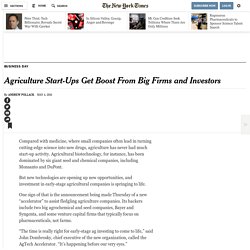
Agricultural biotechnology, for instance, has been dominated by six giant seed and chemical companies, including Monsanto and DuPont. But new technologies are opening up new opportunities, and investment in early-stage agricultural companies is springing to life. One sign of that is the announcement being made Thursday of a new “accelerator” to assist fledgling agriculture companies. Its backers include two big agrochemical and seed companies, Bayer and Syngenta, and some venture capital firms that typically focus on pharmaceuticals, not farms.
“The time is really right for early-stage ag investing to come to life,” said John Dombrosky, chief executive of the new organization, called the AgTech Accelerator. Companies based in the United States raised just over half that total, or $2.4 billion. Continue reading the main story. Japanese firm to open world’s first robot-run farm. 10 data visualisations about hunger and nutrition you need to see - News and blog - Concern Worldwide.
Anaerobic digestion delivers Nestlé a sweet £350,000. An on-site bio-energy plant at Nestlé's Fawdon confectionery factory, near Newcastle in the UK, is helping it cut its carbon footprint and generate value from food production residues.

One year after commissioning Clearfleau, who designed and built the plant, has released the energy output results for the installation. The plant is converting 200,000 litres per day of feedstock into renewable energy. Global food crisis will worsen as heatwaves damage crops, research finds. The world's food crisis, where 1 billion people are already going hungry and a further 2 billion people will be affected by 2050, is set to worsen as increasing heatwaves reverse the rising crop yields seen over the last 50 years, according to new research.
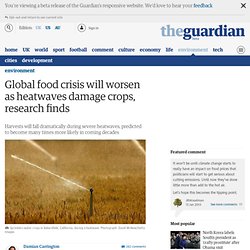
Severe heatwaves, such as those currently seen in Australia, are expected to become many times more likely in coming decades due to climate change. Extreme heat led to 2012 becoming the hottest year in the US on record and the worst corn crop in two decades. New research, which used corn growing in France as an example, predicts losses of up to 12% for maize yields in the next 20 years. A second, longer-term study published on Sunday indicates that, without action against climate change, wheat and soybean harvests will fall by up to 30% by 2050 as the world warms. "Our research rings alarm bells for future food security," said Ed Hawkins, at the University of Reading, who worked on the corn study. Greed, Green & Grains: Declining crop yields. There are many reasons for high commodity prices.
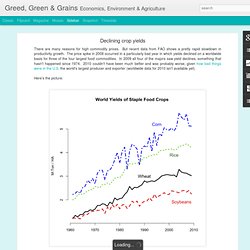
But recent data from FAO shows a pretty rapid slowdown in productivity growth. The price spike in 2008 occurred in a particularly bad year in which yields declined on a worldwide basis for three of the four largest food commodities. In 2009 all four of the majors saw yield declines, something that hasn't happened since 1974. 2010 couldn't have been much better and was probably worse, given how bad things were in the U.S, the world's largest producer and exporter (worldwide data for 2010 isn't available yet). Here's the picture: The yield slowdown comes at a particularly unfortunate time, with accelerating demand from emerging economies like China and subsidy-driven expansion of ethanol.
Maybe it's just bad luck with the weather. Yeah, resource scarcity will be in the news for awhile yet. Update: Lots of interesting commentary over at Mark Thoma's blog. We’re eating our way to disaster.
Inside the meat lab: the future of food. The future feast is laid out around a cool white room at Eindhoven's University of Technology .
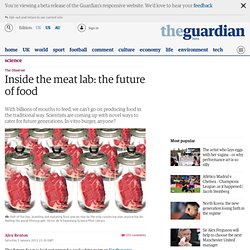
There is a steak tartare of in-vitro beef fibre, wittily knitted into the word "meat". There are "fruit-meat" amuse-gueules. The green- and pink-striped sushi comes from a genetically modified vegetarian fish called the biccio that, usefully, has green- and pink-striped flesh. To wash this down, there's a programmable red wine: with a microwave pulse you can turn it into anything from Montepulciano to a Syrah. GM tomatoes and helpful bacteria claimed to lower cholesterol. Atherosclerosis, more commonly known as hardening of the arteries, can have very serious consequences such as heart attacks and strokes.
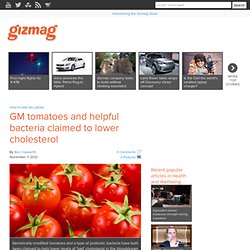
While there are medications that remove some of the offending plaque from the inside of the affected arteries, not everyone wants to take drugs unless absolutely necessary. Lifestyle improvements can certainly help, but soon two other options may be available – probiotics and genetically-engineered tomatoes. The tomatoes, created by researchers at UCLA’s David Geffen School of Medicine, were engineered to produce a peptide (an amino acid compound) known as 6F. That peptide mimics the plaque-reducing actions of ApoA-1, which is the main protein in HDL (high density lipoprotein, or “good” cholesterol). After being freeze dried and ground up, the tomatoes were fed to a group of mice that lacked the ability to remove LDL (low density lipoprotein, or “bad” cholesterol) from their bloodstream.